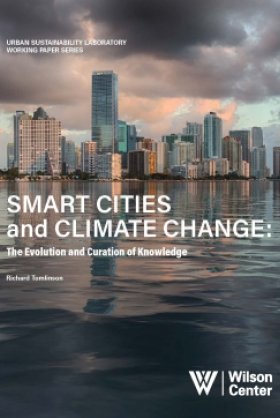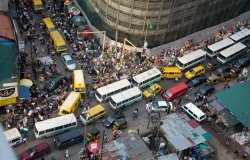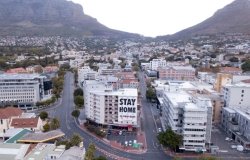Capital City Politics in Comparative Perspective
Overview
The recent volume Capital City Politics in Latin America: Democratization and Empowerment describes how politics in various capital cities in Latin America have changed over the last thirty years. As democratization and decentralization have taken root, municipal institutions have gained influence, new tensions have arisen between traditional elites, municipal leaders, and urban interest groups, and the built environment is less and less a monument to the national government. In an effort to place this volume in an international context, the Comparative Urban Studies Project and the Latin American Program of the Woodrow Wilson Center hosted a seminar on Wednesday, November 6, 2002, on "Capital City Politics in Comparative Perspective."
In his opening remarks, David Myers noted that despite broadened mandates for the municipal governments of many Latin American capital cities, in many cases urban leaders remain frustrated by residual institutional barriers. In fact, one of the key themes of the volume is the reluctance of national governments to empower elected mayors to police the capital. Furthermore, insufficient financial resources and the persistence of notions of entitlement among traditional elites and national political leaders in capital cities prevent mayors from fully capitalizing on the process of decentralization.
With the change from appointed mayors to elected mayors, city leaders must now foster stronger relationships with local constituencies. The formation of political allegiances and the emergence of effective political leaders in capital cities remain key determinants of the level of empowerment of capital city populations. Henry Dietz suggested that future research should examine whether local issues have given rise to local political parties or whether political groupings in capital cities simply mirror those of national politics. Will political parties in capital cities begin to represent class interests, focus on issues particular to the capital city, or will they follow already formulated national parties?
Josep Subiros argued that the volume over-utilized Samuel Huntington's waves of democratization as a political law of gravity. Instead, Subiros suggested that economic conditions, interest conflicts, migration, the urbanization process itself, social movements, grassroots organizations, and cultural trends are in fact more pivotal in affecting the democratization process. City politics are not simply a by-product or a marginal result of national political processes but the product of a complex civic discourse. To truly grasp what is happening to politics in capital cities, Subiros suggested, we should examine international economic policies and terms of exchange at the macro-level, and the state of grassroots organizations and public participation at the micro-level.
The second panelist, Setha Low, commended the editors for the attention the volume devotes to the subject of the built environment. Physical urban space facilitates political expression, and additionally, changes in the built environment can reveal changes in urban politics. That is, what kinds of physical investments are being made in a city indicates for whom buildings and neighborhoods are being rebuilt and which public interest is being addressed. A recent debate in Oaxaca, Mexico, for example, over whether or not to allow a proposed McDonald's to be built on the central plaza of the city illustrates the politicization of space in Latin America.
Complementing Subiros' more theoretical discussion and Low's discussion of urban space, Aprodicio Laquian analyzed the similarities between the Asian and Latin American capital city experience. Laquian noted that capital cities in both regions have experienced considerable tension between the national leaders, local elites, and municipal governments. Laquian noted, however, that the growth of a strong civil society, which often coincides with the decentralization process, has in Asia led to the frequent formulation of strong oppositionist movements in capital cities.
At the core of the democratization process sits the ability of the general population to be actively involved in the political process. The particular barriers of capital city politics, the remnants of national level dominance and traditional power structures, complicate urban politics. Panelists agreed that in both Latin America and elsewhere more attention should be paid to the role of public space in fostering democratization and empowerment.
Hosted By

Urban Sustainability Laboratory
Since 1991, the Urban Sustainability Laboratory has advanced solutions to urban challenges—such as poverty, exclusion, insecurity, and environmental degradation—by promoting evidence-based research to support sustainable, equitable and peaceful cities. Read more
Thank you for your interest in this event. Please send any feedback or questions to our Events staff.









